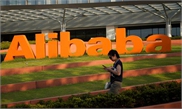
Working staff attend the Alibaba Annual Party celebrating the 18th anniversary of the Alibaba Group, China's e-commerce giant, in Hangzhou, capital of east China's Zhejiang Province, Sept. 8, 2017. About 40,000 Alibaba employees from dozens of countries and regions attended the party. (Xinhua/Shen Bohan)
Alibaba Group Holding is expected to set its share price at HK$176 ($22.49) in its much-anticipated Hong Kong listing, which will enable the Chinese e-commerce giant to raise up to HK$101.2 billion, the largest sale in the city since 2011.
The listing ceremony is expected to be held at the Hong Kong Stock Exchange on November 26.
Alibaba's Hong Kong listing, which comes amid months of social unrest in the city, might help the financial hub return to the center of capital markets. It will also help the Chinese company find alternative financing sources during the ongoing trade war with the US, industry analysts said.
"The share price is reasonable and is set based on its shares that are traded in New York ... around 3 percent lower," Yang Delong, chief economist at Shenzhen-based First Seafront Fund Management Co, told the Global Times on Wednesday.
Alibaba shares closed in New York on Tuesday at $185.25, up 0.35 percent.
However, an insider who closely follows Alibaba told the Global Times on Wednesday that the price - both the set price for its Hong Kong listing and its New York price - undervalues the e-commerce giant.
The insider forecast the share price will rise by more than 10 percent.
Investors have high hopes for the company, with an over-subscription rate of more than 40 times for retail investors, a report from Shanghai Securities News showed.
During the company's Double 11 Shopping festival on November 11 this year, which is also the largest shopping spree in the world, total sales of $1 billion were recorded in just the first 68 seconds on its platform, which a Forbes report said could translate to an entire year of revenues at Best Buy in 42 minutes or an entire year of Target's business in 77 minutes.
"The secondary listing will help Alibaba raise funds from Chinese institutions that could not buy the company's US shares, and offer it an alternative source for funding given the uncertainties between China and the US," another insider told the Global Times.
Yang said that as Hong Kong's situation has greatly hampered investors' confidence, the move might shore up capital markets' confidence in Hong Kong and more Chinese technology giants might follow suit.
As some US politicians are calling for tightened scrutiny of Chinese investment, Chinese private companies are shunning the US in their overseas expansion, and generally prefer a home listing to a US IPO, Reuters reported, citing a private survey conducted jointly by Tsinghua University and Marcum Bernstein and Pinchuk LLP.
The survey found that Hong Kong, even with the city's ongoing unrest, is ahead of the US as a preferred IPO destination, according to Reuters.

